Natural Law and State Theory 2022
Added on 2022-09-12
26 Pages6335 Words22 Views
Running head: NATURAL LAW AND STATE THEORY
Natural Law and State Theory
Name of the Student
Name of the University
Author Note
Natural Law and State Theory
Name of the Student
Name of the University
Author Note
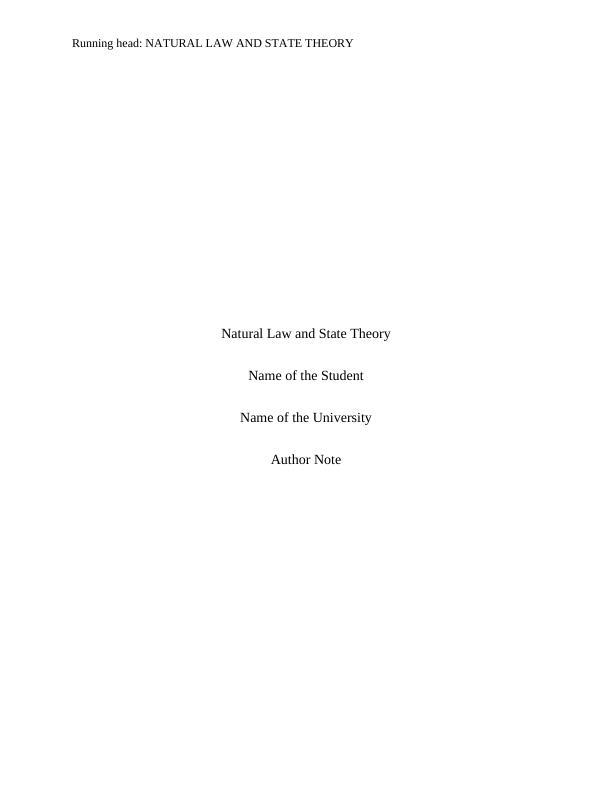
NATURAL LAW AND STATE THEORY1
Natural law is based on the notion that human beings are morally upright
and are characterized by an innate sense of inner justice which guides them to do
what is right and what is wrong, and which in turn proves to be far more effective
in ensuring justice in comparison to the type of justice that is imposed by figures of
authority.1 In essence, natural law is a theory of the law which takes recognition of
the fact that morality and the law are two entities that are deeply connected to one
another, and that one is inseparable without the other. Human beings are moral
beings and they know deep within what actions may be construed as correct or
right and what actions are undesirable and should avoided being undertaken in the
first place.2 In the view of theorists and scholars of theology, natural law is what
instructs an individual to do the right thing at the right time, and the impact that is
associated with natural law and its implementation appears to be far more profound
since it is rooted essentially in a person’s psyche or character more than anything
else. This assignment enters into a detailed discussion on the subject of natural law
and whether or not natural law can be considered to be an indispensable dimension
of moral theories of the state. For this purpose, the assignment analyzes in detail
the theories that have been propounded by John Rawls in his seminal work
published in 1971 known as Theory of Justice. The essay concludes with the
argument that while natural law is intrinsic and essential and while its existence
1 Sampford, Charles, and Spencer Zifcak. Rethinking international law and justice. Routledge, 2016.
2 Ibid
Natural law is based on the notion that human beings are morally upright
and are characterized by an innate sense of inner justice which guides them to do
what is right and what is wrong, and which in turn proves to be far more effective
in ensuring justice in comparison to the type of justice that is imposed by figures of
authority.1 In essence, natural law is a theory of the law which takes recognition of
the fact that morality and the law are two entities that are deeply connected to one
another, and that one is inseparable without the other. Human beings are moral
beings and they know deep within what actions may be construed as correct or
right and what actions are undesirable and should avoided being undertaken in the
first place.2 In the view of theorists and scholars of theology, natural law is what
instructs an individual to do the right thing at the right time, and the impact that is
associated with natural law and its implementation appears to be far more profound
since it is rooted essentially in a person’s psyche or character more than anything
else. This assignment enters into a detailed discussion on the subject of natural law
and whether or not natural law can be considered to be an indispensable dimension
of moral theories of the state. For this purpose, the assignment analyzes in detail
the theories that have been propounded by John Rawls in his seminal work
published in 1971 known as Theory of Justice. The essay concludes with the
argument that while natural law is intrinsic and essential and while its existence
1 Sampford, Charles, and Spencer Zifcak. Rethinking international law and justice. Routledge, 2016.
2 Ibid
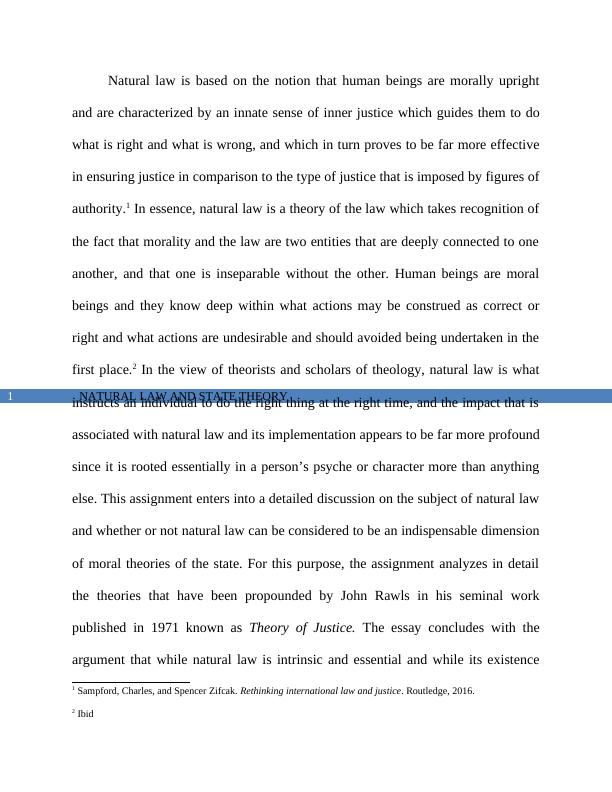
NATURAL LAW AND STATE THEORY2
and relevance cannot be denied, the system of distributive justice also needs to be
in place in order to ensure the proper implementation of the law and to guarantee
the outreach of justice to each and every person living in society. 3
Prior to understanding how natural law can be understood as a crucial
dimension of moralistic views or theories of the state, it would first be worthwhile
to discuss what natural law is all about and what in essence that it entails. The
Christian concept of natural law is one which is based on the theory or the belief
that the morality in human beings is something that stems from nature. All human
beings have a purpose on life. 4They are born on earth for a purpose and they have
goals to fulfill for as long as they are here on earth. In the view of theorists of
natural law, the most important purpose of human life is to lead an existence that is
happy, and which is morally upright with no harm being done to fellow human
beings, birds or animals and with every attempt being made on the part of human
beings to live in peace and prosperity. The actions that are undertaken by human
beings in the course of their lives, as argued by theorists of natural law, are those
that are meant to fulfill this end. Each and every human being on the face of the
earth is expected to lead a life which is morally sound, with few or no ills being
committed and with the goal of life being to attain happiness and to spread
3 Covell, Charles. The Defence of Natural Law: A Study of the Ideas of Law and Justice in the Writings of Lon L.
Fuller, Michael Oakeshot, FA Hayek, Ronald Dworkin and John Finnis. Springer, 2016.
4 Ross, Alf. On law and justice. Oxford University Press, 2019
and relevance cannot be denied, the system of distributive justice also needs to be
in place in order to ensure the proper implementation of the law and to guarantee
the outreach of justice to each and every person living in society. 3
Prior to understanding how natural law can be understood as a crucial
dimension of moralistic views or theories of the state, it would first be worthwhile
to discuss what natural law is all about and what in essence that it entails. The
Christian concept of natural law is one which is based on the theory or the belief
that the morality in human beings is something that stems from nature. All human
beings have a purpose on life. 4They are born on earth for a purpose and they have
goals to fulfill for as long as they are here on earth. In the view of theorists of
natural law, the most important purpose of human life is to lead an existence that is
happy, and which is morally upright with no harm being done to fellow human
beings, birds or animals and with every attempt being made on the part of human
beings to live in peace and prosperity. The actions that are undertaken by human
beings in the course of their lives, as argued by theorists of natural law, are those
that are meant to fulfill this end. Each and every human being on the face of the
earth is expected to lead a life which is morally sound, with few or no ills being
committed and with the goal of life being to attain happiness and to spread
3 Covell, Charles. The Defence of Natural Law: A Study of the Ideas of Law and Justice in the Writings of Lon L.
Fuller, Michael Oakeshot, FA Hayek, Ronald Dworkin and John Finnis. Springer, 2016.
4 Ross, Alf. On law and justice. Oxford University Press, 2019
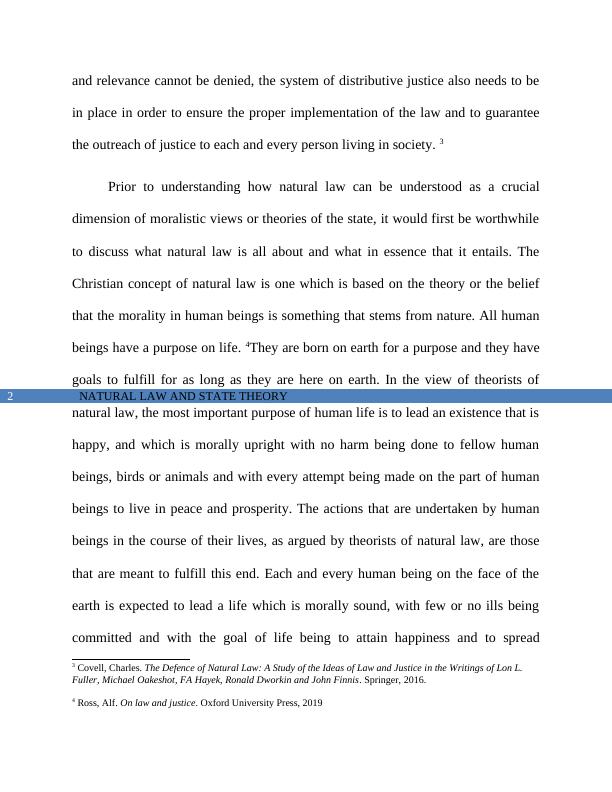
NATURAL LAW AND STATE THEORY3
happiness for fellow human beings. 5It is further argued by the theorists of natural
law, that true happiness is something that comes from leading a life that is morally
upright. Where there is vice, there is no room for happiness. Actions which are
immoral on the other hand are those that are unnatural and such actions are likely
to play in role in causing unhappiness for human beings.6 Actions which are
immoral and which are not based on honesty and justice are actions that are
designed to cause human beings a great deal of unhappiness and can truly keep
them from attaining their goals and objectives in life, the primary goals being to
acquire happiness and to retain happiness over the long term. 7
Natural law in the view of thinkers like Plato finds manifestation in an
orderly universe where good behavior and good actions constitute the cause of all
things. Aristotle was a philosopher who pointed out the distinction between nature
and custom, stating that while custom could change, nature should always remain
the same, indicating that law should always be moral and upright and the natural
good of things should always be the focus of the legal or justice system.8 Cicero
was a thinker who firmly believed in the laws of nature. Natural law or the innate
goodness of human beings was something which for Cicero took precedence over
5 Ross, Alf. On law and justice. Oxford University Press, 2019
6 Pound, Roscoe, and Marshall L. DeRosa. An introduction to the philosophy of law. Routledge, 2017.
7 Ibid
8 Pound, Roscoe, and Marshall L. DeRosa. An introduction to the philosophy of law. Routledge, 2017.
happiness for fellow human beings. 5It is further argued by the theorists of natural
law, that true happiness is something that comes from leading a life that is morally
upright. Where there is vice, there is no room for happiness. Actions which are
immoral on the other hand are those that are unnatural and such actions are likely
to play in role in causing unhappiness for human beings.6 Actions which are
immoral and which are not based on honesty and justice are actions that are
designed to cause human beings a great deal of unhappiness and can truly keep
them from attaining their goals and objectives in life, the primary goals being to
acquire happiness and to retain happiness over the long term. 7
Natural law in the view of thinkers like Plato finds manifestation in an
orderly universe where good behavior and good actions constitute the cause of all
things. Aristotle was a philosopher who pointed out the distinction between nature
and custom, stating that while custom could change, nature should always remain
the same, indicating that law should always be moral and upright and the natural
good of things should always be the focus of the legal or justice system.8 Cicero
was a thinker who firmly believed in the laws of nature. Natural law or the innate
goodness of human beings was something which for Cicero took precedence over
5 Ross, Alf. On law and justice. Oxford University Press, 2019
6 Pound, Roscoe, and Marshall L. DeRosa. An introduction to the philosophy of law. Routledge, 2017.
7 Ibid
8 Pound, Roscoe, and Marshall L. DeRosa. An introduction to the philosophy of law. Routledge, 2017.
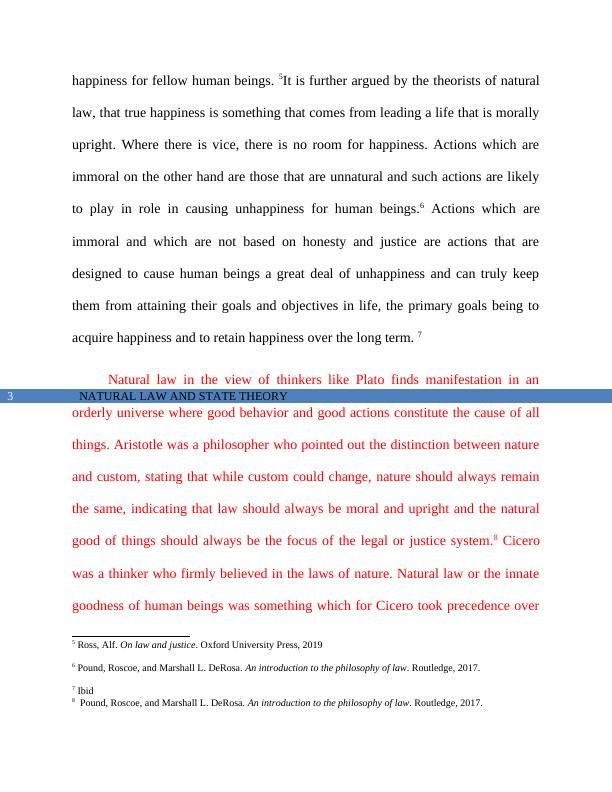
NATURAL LAW AND STATE THEORY4
laws passed by the government. For philosophers like Augustine of Hippo, natural
law is eternal law, it is inscribed in the most powerful way in the soul of human
beings. The voice of this law is the human conscience and the imperium of this law
is good behavior. In the view of Acquinas, the imperative need or desire in human
beings to perform acts of good and to avoid evil behavior is what constitutes the
natural law of human beings.9 For Luther, natural law refers to the innate goodness
of human beings and it is inscribed in the human heart as well as in the
commandments of God against adultery, murder and other sins. Locke believed
that morality is something that all human beings are bound by and that morality is
something that is fundamentally about duty. This morality forms the basis of
natural law which according to Locke, all human beings need to follow According
to John Calvin, natural law forms an important basis of Christianity, and that it
asserts both the omnipotence as well as the righteousness of God. In the view of
Hobbes, natural law is a general rule or precept that keeps a man from engaging in
behavior that is destructive in nature and which preserves the meaning of his life.
Lamartine was a philosopher who was also quite sympathetic to the cause and
implementation of natural law, arguing that natural law needs to take precedence
over government laws and that human beings need to be guided by their innate
9 Ross, Alf. On law and justice. Oxford University Press, 2019
laws passed by the government. For philosophers like Augustine of Hippo, natural
law is eternal law, it is inscribed in the most powerful way in the soul of human
beings. The voice of this law is the human conscience and the imperium of this law
is good behavior. In the view of Acquinas, the imperative need or desire in human
beings to perform acts of good and to avoid evil behavior is what constitutes the
natural law of human beings.9 For Luther, natural law refers to the innate goodness
of human beings and it is inscribed in the human heart as well as in the
commandments of God against adultery, murder and other sins. Locke believed
that morality is something that all human beings are bound by and that morality is
something that is fundamentally about duty. This morality forms the basis of
natural law which according to Locke, all human beings need to follow According
to John Calvin, natural law forms an important basis of Christianity, and that it
asserts both the omnipotence as well as the righteousness of God. In the view of
Hobbes, natural law is a general rule or precept that keeps a man from engaging in
behavior that is destructive in nature and which preserves the meaning of his life.
Lamartine was a philosopher who was also quite sympathetic to the cause and
implementation of natural law, arguing that natural law needs to take precedence
over government laws and that human beings need to be guided by their innate
9 Ross, Alf. On law and justice. Oxford University Press, 2019
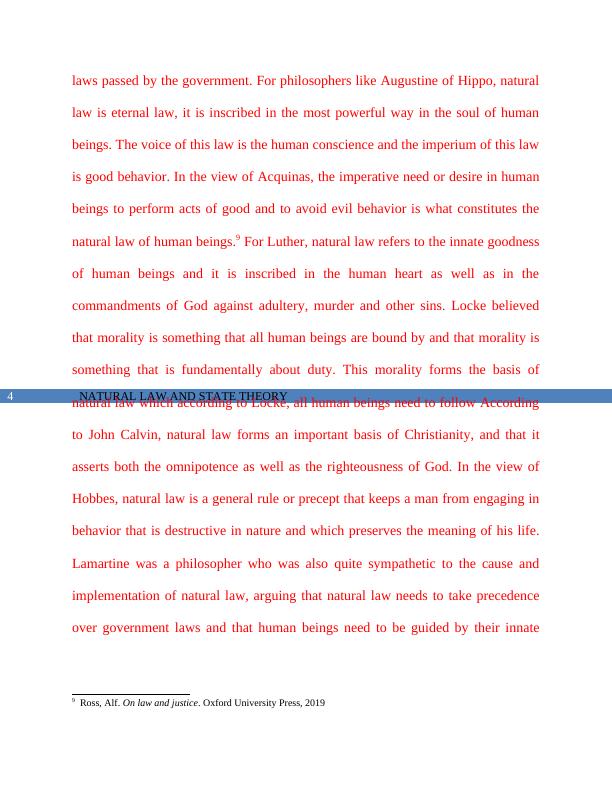
NATURAL LAW AND STATE THEORY5
goodness and moral behavior in order to avoid being misguided or drawn by evil,
which can otherwise take them down the path of destruction.10
One crucial aspect of natural legal theory is that the law is served by a
purpose. The primary purpose of law is to ensure the provision of justice. From the
perspective of natural law therefore, any law that is not capable of providing
justice is a law that cannot be considered to be a law in the first place. Laws which
are good are those that may be regarded to be moral while laws which are bad are
unjust law, and ought not to be followed by human beings.11 Legal positivism is a
notion that is strongly opposed to the theory of moral law, therefore. People who
are legal positivists are of the view that no matter how deeply flawed a law
happens to be, it still has a purpose and should be implemented.12 Natural law
proponents are of the view that laws which are not rooted in a sense of justice or in
a sense of right or wrong are not really laws and to consider them to be law would
be wrong on the part of human being, The primary purpose of law, as the natural
legal theorists argue, is to help human beings distinguish between right and wrong,
to understand what behavior or actions need to be taken in order to remain on a
morally upright path and which are the actions that ought to be avoided in order
10 Ross, Alf. On law and justice. Oxford University Press, 2019
11 Pound, Roscoe, and Marshall L. DeRosa. An introduction to the philosophy of law. Routledge, 2017.
12 Pound, Roscoe, and Marshall L. DeRosa. An introduction to the philosophy of law. Routledge, 2017.
goodness and moral behavior in order to avoid being misguided or drawn by evil,
which can otherwise take them down the path of destruction.10
One crucial aspect of natural legal theory is that the law is served by a
purpose. The primary purpose of law is to ensure the provision of justice. From the
perspective of natural law therefore, any law that is not capable of providing
justice is a law that cannot be considered to be a law in the first place. Laws which
are good are those that may be regarded to be moral while laws which are bad are
unjust law, and ought not to be followed by human beings.11 Legal positivism is a
notion that is strongly opposed to the theory of moral law, therefore. People who
are legal positivists are of the view that no matter how deeply flawed a law
happens to be, it still has a purpose and should be implemented.12 Natural law
proponents are of the view that laws which are not rooted in a sense of justice or in
a sense of right or wrong are not really laws and to consider them to be law would
be wrong on the part of human being, The primary purpose of law, as the natural
legal theorists argue, is to help human beings distinguish between right and wrong,
to understand what behavior or actions need to be taken in order to remain on a
morally upright path and which are the actions that ought to be avoided in order
10 Ross, Alf. On law and justice. Oxford University Press, 2019
11 Pound, Roscoe, and Marshall L. DeRosa. An introduction to the philosophy of law. Routledge, 2017.
12 Pound, Roscoe, and Marshall L. DeRosa. An introduction to the philosophy of law. Routledge, 2017.
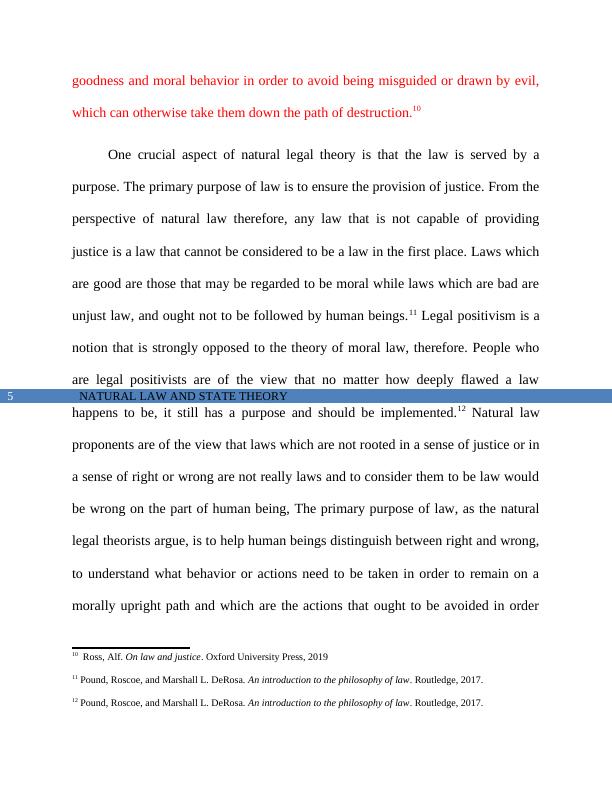
End of preview
Want to access all the pages? Upload your documents or become a member.
Related Documents
Sample Assignment on Philosophylg...
|5
|958
|120
Case Study | Nursing Ethicslg...
|9
|2884
|43
Natural Law Theory : Assignmentlg...
|9
|2919
|141
Human Rights in Historylg...
|8
|2938
|94
Paper on Ethics in Christianitylg...
|10
|2257
|55
Bioethical Issue of Abortion: A Teleological and Deontological Approachlg...
|7
|1696
|274
